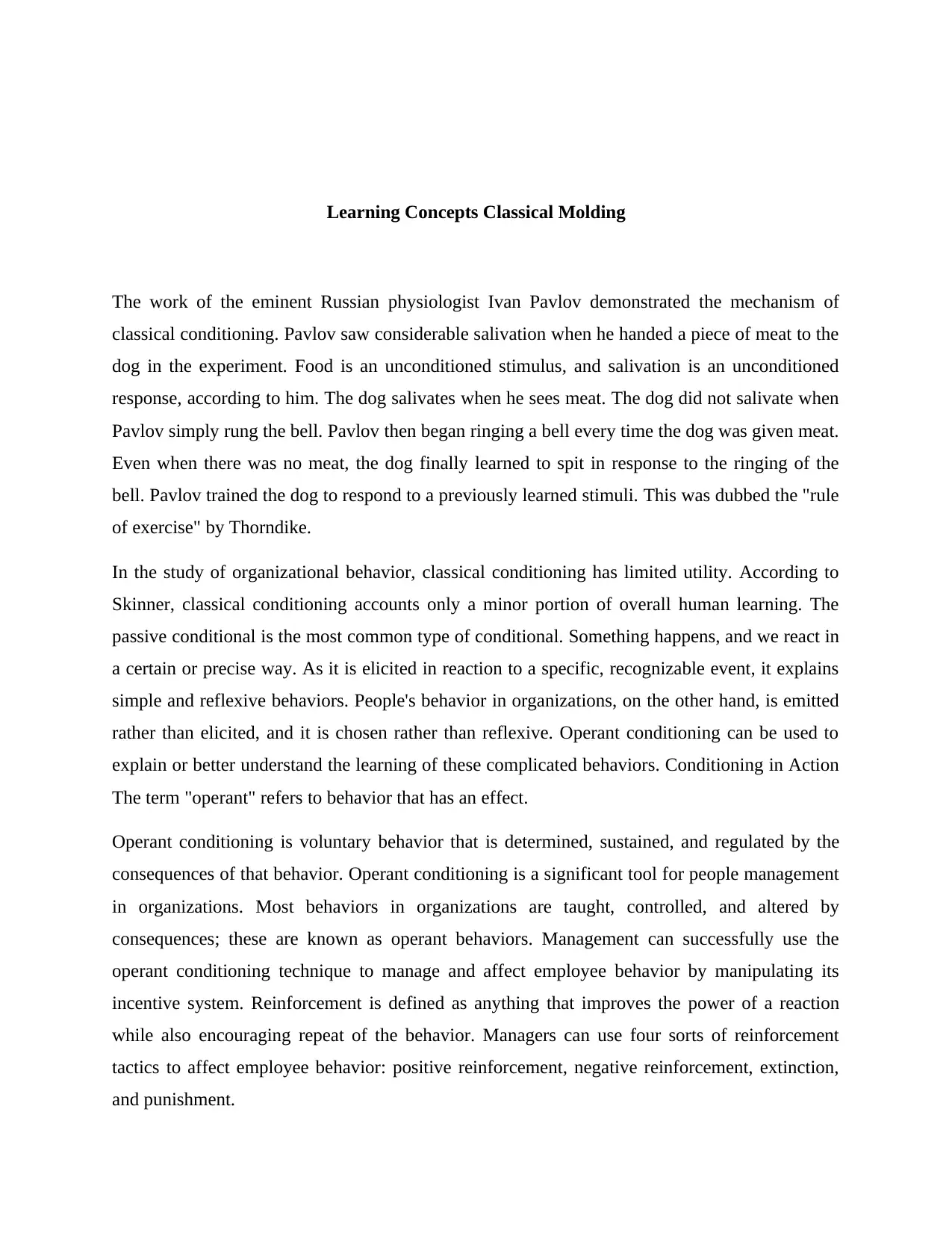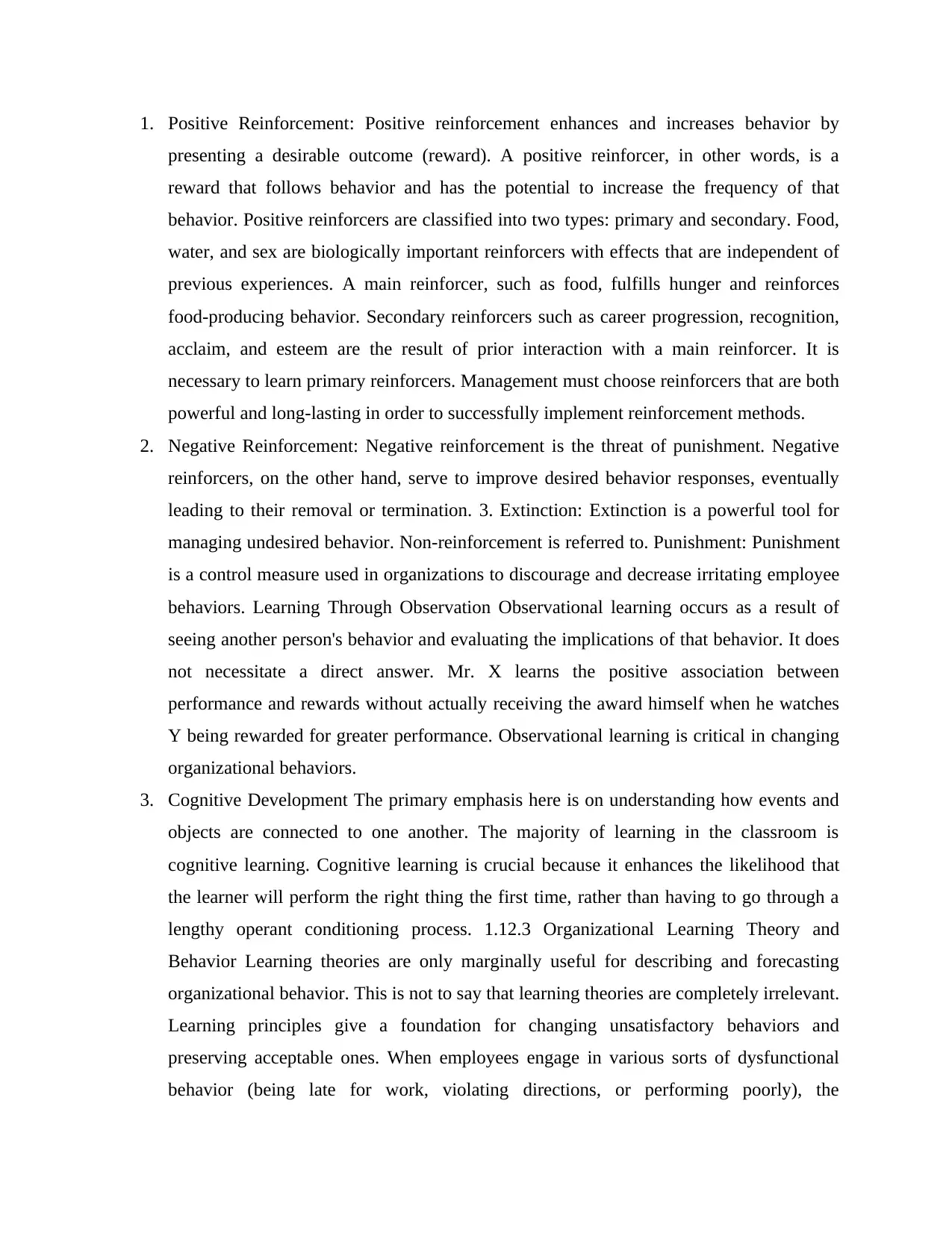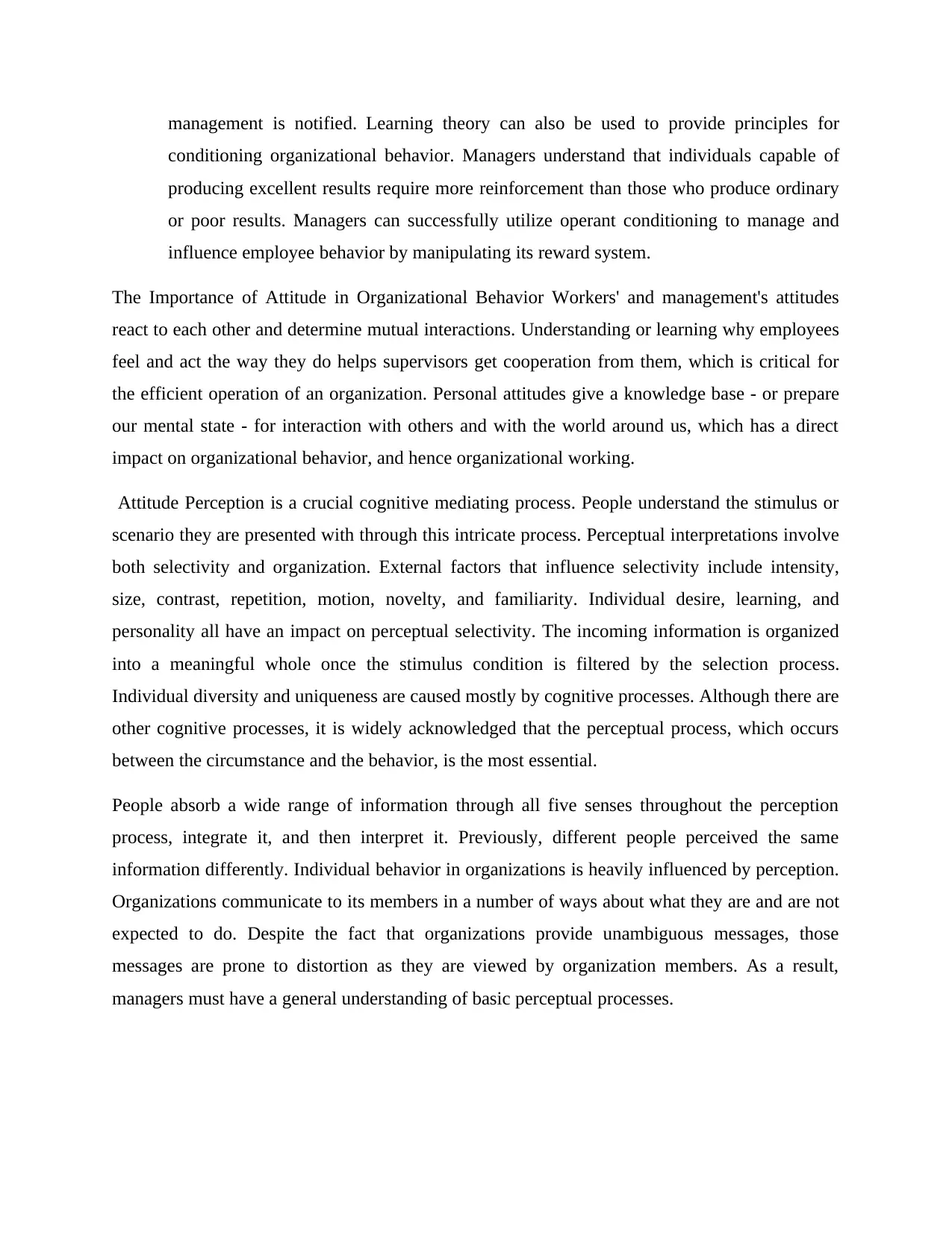Analysis of Learning Theories in Organizational Behavior and Attitudes
VerifiedAdded on 2023/02/07
|3
|1171
|32
Homework Assignment
AI Summary
This document delves into the principles of classical and operant conditioning, emphasizing their relevance within organizational behavior. It begins by explaining classical conditioning, using Pavlov's experiment as a foundational example, and then contrasts it with operant conditioning, highlighting its greater applicability to complex human behaviors in a workplace setting. The paper elaborates on operant conditioning, detailing reinforcement techniques such as positive and negative reinforcement, extinction, and punishment, and how these can be strategically employed by management. Furthermore, it examines observational learning and cognitive development as crucial elements in shaping organizational behaviors. The text also underscores the importance of attitude perception and its influence on interactions within an organization. The document concludes by underscoring the value of learning theories in modifying behaviors and promoting desired outcomes, stressing that managers can use these principles to influence employee behavior by manipulating reward systems.

Learning Concepts Classical Molding
The work of the eminent Russian physiologist Ivan Pavlov demonstrated the mechanism of
classical conditioning. Pavlov saw considerable salivation when he handed a piece of meat to the
dog in the experiment. Food is an unconditioned stimulus, and salivation is an unconditioned
response, according to him. The dog salivates when he sees meat. The dog did not salivate when
Pavlov simply rung the bell. Pavlov then began ringing a bell every time the dog was given meat.
Even when there was no meat, the dog finally learned to spit in response to the ringing of the
bell. Pavlov trained the dog to respond to a previously learned stimuli. This was dubbed the "rule
of exercise" by Thorndike.
In the study of organizational behavior, classical conditioning has limited utility. According to
Skinner, classical conditioning accounts only a minor portion of overall human learning. The
passive conditional is the most common type of conditional. Something happens, and we react in
a certain or precise way. As it is elicited in reaction to a specific, recognizable event, it explains
simple and reflexive behaviors. People's behavior in organizations, on the other hand, is emitted
rather than elicited, and it is chosen rather than reflexive. Operant conditioning can be used to
explain or better understand the learning of these complicated behaviors. Conditioning in Action
The term "operant" refers to behavior that has an effect.
Operant conditioning is voluntary behavior that is determined, sustained, and regulated by the
consequences of that behavior. Operant conditioning is a significant tool for people management
in organizations. Most behaviors in organizations are taught, controlled, and altered by
consequences; these are known as operant behaviors. Management can successfully use the
operant conditioning technique to manage and affect employee behavior by manipulating its
incentive system. Reinforcement is defined as anything that improves the power of a reaction
while also encouraging repeat of the behavior. Managers can use four sorts of reinforcement
tactics to affect employee behavior: positive reinforcement, negative reinforcement, extinction,
and punishment.
The work of the eminent Russian physiologist Ivan Pavlov demonstrated the mechanism of
classical conditioning. Pavlov saw considerable salivation when he handed a piece of meat to the
dog in the experiment. Food is an unconditioned stimulus, and salivation is an unconditioned
response, according to him. The dog salivates when he sees meat. The dog did not salivate when
Pavlov simply rung the bell. Pavlov then began ringing a bell every time the dog was given meat.
Even when there was no meat, the dog finally learned to spit in response to the ringing of the
bell. Pavlov trained the dog to respond to a previously learned stimuli. This was dubbed the "rule
of exercise" by Thorndike.
In the study of organizational behavior, classical conditioning has limited utility. According to
Skinner, classical conditioning accounts only a minor portion of overall human learning. The
passive conditional is the most common type of conditional. Something happens, and we react in
a certain or precise way. As it is elicited in reaction to a specific, recognizable event, it explains
simple and reflexive behaviors. People's behavior in organizations, on the other hand, is emitted
rather than elicited, and it is chosen rather than reflexive. Operant conditioning can be used to
explain or better understand the learning of these complicated behaviors. Conditioning in Action
The term "operant" refers to behavior that has an effect.
Operant conditioning is voluntary behavior that is determined, sustained, and regulated by the
consequences of that behavior. Operant conditioning is a significant tool for people management
in organizations. Most behaviors in organizations are taught, controlled, and altered by
consequences; these are known as operant behaviors. Management can successfully use the
operant conditioning technique to manage and affect employee behavior by manipulating its
incentive system. Reinforcement is defined as anything that improves the power of a reaction
while also encouraging repeat of the behavior. Managers can use four sorts of reinforcement
tactics to affect employee behavior: positive reinforcement, negative reinforcement, extinction,
and punishment.
Paraphrase This Document
Need a fresh take? Get an instant paraphrase of this document with our AI Paraphraser

1. Positive Reinforcement: Positive reinforcement enhances and increases behavior by
presenting a desirable outcome (reward). A positive reinforcer, in other words, is a
reward that follows behavior and has the potential to increase the frequency of that
behavior. Positive reinforcers are classified into two types: primary and secondary. Food,
water, and sex are biologically important reinforcers with effects that are independent of
previous experiences. A main reinforcer, such as food, fulfills hunger and reinforces
food-producing behavior. Secondary reinforcers such as career progression, recognition,
acclaim, and esteem are the result of prior interaction with a main reinforcer. It is
necessary to learn primary reinforcers. Management must choose reinforcers that are both
powerful and long-lasting in order to successfully implement reinforcement methods.
2. Negative Reinforcement: Negative reinforcement is the threat of punishment. Negative
reinforcers, on the other hand, serve to improve desired behavior responses, eventually
leading to their removal or termination. 3. Extinction: Extinction is a powerful tool for
managing undesired behavior. Non-reinforcement is referred to. Punishment: Punishment
is a control measure used in organizations to discourage and decrease irritating employee
behaviors. Learning Through Observation Observational learning occurs as a result of
seeing another person's behavior and evaluating the implications of that behavior. It does
not necessitate a direct answer. Mr. X learns the positive association between
performance and rewards without actually receiving the award himself when he watches
Y being rewarded for greater performance. Observational learning is critical in changing
organizational behaviors.
3. Cognitive Development The primary emphasis here is on understanding how events and
objects are connected to one another. The majority of learning in the classroom is
cognitive learning. Cognitive learning is crucial because it enhances the likelihood that
the learner will perform the right thing the first time, rather than having to go through a
lengthy operant conditioning process. 1.12.3 Organizational Learning Theory and
Behavior Learning theories are only marginally useful for describing and forecasting
organizational behavior. This is not to say that learning theories are completely irrelevant.
Learning principles give a foundation for changing unsatisfactory behaviors and
preserving acceptable ones. When employees engage in various sorts of dysfunctional
behavior (being late for work, violating directions, or performing poorly), the
presenting a desirable outcome (reward). A positive reinforcer, in other words, is a
reward that follows behavior and has the potential to increase the frequency of that
behavior. Positive reinforcers are classified into two types: primary and secondary. Food,
water, and sex are biologically important reinforcers with effects that are independent of
previous experiences. A main reinforcer, such as food, fulfills hunger and reinforces
food-producing behavior. Secondary reinforcers such as career progression, recognition,
acclaim, and esteem are the result of prior interaction with a main reinforcer. It is
necessary to learn primary reinforcers. Management must choose reinforcers that are both
powerful and long-lasting in order to successfully implement reinforcement methods.
2. Negative Reinforcement: Negative reinforcement is the threat of punishment. Negative
reinforcers, on the other hand, serve to improve desired behavior responses, eventually
leading to their removal or termination. 3. Extinction: Extinction is a powerful tool for
managing undesired behavior. Non-reinforcement is referred to. Punishment: Punishment
is a control measure used in organizations to discourage and decrease irritating employee
behaviors. Learning Through Observation Observational learning occurs as a result of
seeing another person's behavior and evaluating the implications of that behavior. It does
not necessitate a direct answer. Mr. X learns the positive association between
performance and rewards without actually receiving the award himself when he watches
Y being rewarded for greater performance. Observational learning is critical in changing
organizational behaviors.
3. Cognitive Development The primary emphasis here is on understanding how events and
objects are connected to one another. The majority of learning in the classroom is
cognitive learning. Cognitive learning is crucial because it enhances the likelihood that
the learner will perform the right thing the first time, rather than having to go through a
lengthy operant conditioning process. 1.12.3 Organizational Learning Theory and
Behavior Learning theories are only marginally useful for describing and forecasting
organizational behavior. This is not to say that learning theories are completely irrelevant.
Learning principles give a foundation for changing unsatisfactory behaviors and
preserving acceptable ones. When employees engage in various sorts of dysfunctional
behavior (being late for work, violating directions, or performing poorly), the

management is notified. Learning theory can also be used to provide principles for
conditioning organizational behavior. Managers understand that individuals capable of
producing excellent results require more reinforcement than those who produce ordinary
or poor results. Managers can successfully utilize operant conditioning to manage and
influence employee behavior by manipulating its reward system.
The Importance of Attitude in Organizational Behavior Workers' and management's attitudes
react to each other and determine mutual interactions. Understanding or learning why employees
feel and act the way they do helps supervisors get cooperation from them, which is critical for
the efficient operation of an organization. Personal attitudes give a knowledge base - or prepare
our mental state - for interaction with others and with the world around us, which has a direct
impact on organizational behavior, and hence organizational working.
Attitude Perception is a crucial cognitive mediating process. People understand the stimulus or
scenario they are presented with through this intricate process. Perceptual interpretations involve
both selectivity and organization. External factors that influence selectivity include intensity,
size, contrast, repetition, motion, novelty, and familiarity. Individual desire, learning, and
personality all have an impact on perceptual selectivity. The incoming information is organized
into a meaningful whole once the stimulus condition is filtered by the selection process.
Individual diversity and uniqueness are caused mostly by cognitive processes. Although there are
other cognitive processes, it is widely acknowledged that the perceptual process, which occurs
between the circumstance and the behavior, is the most essential.
People absorb a wide range of information through all five senses throughout the perception
process, integrate it, and then interpret it. Previously, different people perceived the same
information differently. Individual behavior in organizations is heavily influenced by perception.
Organizations communicate to its members in a number of ways about what they are and are not
expected to do. Despite the fact that organizations provide unambiguous messages, those
messages are prone to distortion as they are viewed by organization members. As a result,
managers must have a general understanding of basic perceptual processes.
conditioning organizational behavior. Managers understand that individuals capable of
producing excellent results require more reinforcement than those who produce ordinary
or poor results. Managers can successfully utilize operant conditioning to manage and
influence employee behavior by manipulating its reward system.
The Importance of Attitude in Organizational Behavior Workers' and management's attitudes
react to each other and determine mutual interactions. Understanding or learning why employees
feel and act the way they do helps supervisors get cooperation from them, which is critical for
the efficient operation of an organization. Personal attitudes give a knowledge base - or prepare
our mental state - for interaction with others and with the world around us, which has a direct
impact on organizational behavior, and hence organizational working.
Attitude Perception is a crucial cognitive mediating process. People understand the stimulus or
scenario they are presented with through this intricate process. Perceptual interpretations involve
both selectivity and organization. External factors that influence selectivity include intensity,
size, contrast, repetition, motion, novelty, and familiarity. Individual desire, learning, and
personality all have an impact on perceptual selectivity. The incoming information is organized
into a meaningful whole once the stimulus condition is filtered by the selection process.
Individual diversity and uniqueness are caused mostly by cognitive processes. Although there are
other cognitive processes, it is widely acknowledged that the perceptual process, which occurs
between the circumstance and the behavior, is the most essential.
People absorb a wide range of information through all five senses throughout the perception
process, integrate it, and then interpret it. Previously, different people perceived the same
information differently. Individual behavior in organizations is heavily influenced by perception.
Organizations communicate to its members in a number of ways about what they are and are not
expected to do. Despite the fact that organizations provide unambiguous messages, those
messages are prone to distortion as they are viewed by organization members. As a result,
managers must have a general understanding of basic perceptual processes.
⊘ This is a preview!⊘
Do you want full access?
Subscribe today to unlock all pages.

Trusted by 1+ million students worldwide
1 out of 3
Related Documents
Your All-in-One AI-Powered Toolkit for Academic Success.
+13062052269
info@desklib.com
Available 24*7 on WhatsApp / Email
![[object Object]](/_next/static/media/star-bottom.7253800d.svg)
Unlock your academic potential
Copyright © 2020–2026 A2Z Services. All Rights Reserved. Developed and managed by ZUCOL.





